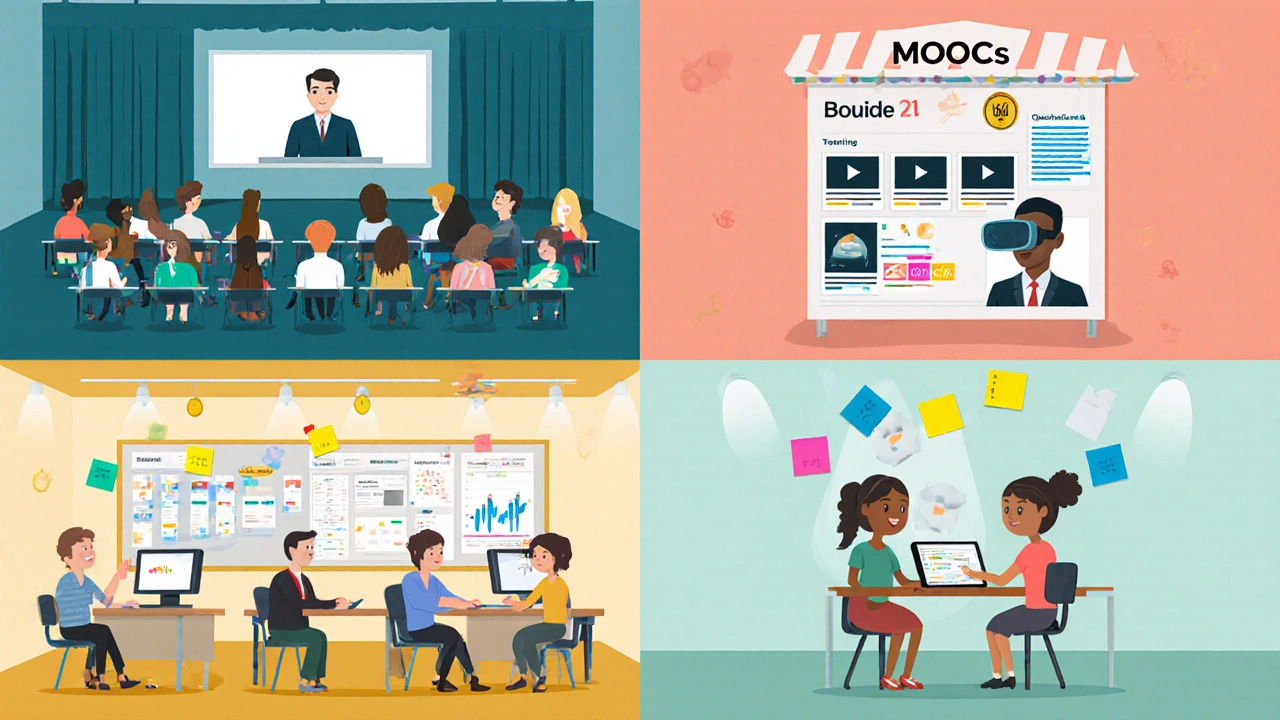E-Learning Platform Selector
Find Your Perfect E-Learning Platform
Answer a few quick questions to identify which type of e-learning platform suits your needs best.
Recommended Platform Types
When you ask, “How many digital platforms are there?” the answer isn’t a simple number on a screen. The world of e-learning platforms exploded over the last decade, moving from a handful of university‑run portals to a bustling marketplace of thousands of services. In 2025 you’ll find everything from massive open‑online courses (MOOCs) to niche skill‑marketplaces, corporate learning management systems (LMS), and free‑to‑use classroom tools. Below we break down the scale, categories, and the most influential players you’re likely to encounter.
Key Takeaways
- Globally there are more than 300 actively maintained e‑learning platforms, ranging from free MOOCs to enterprise‑grade LMS.
- Platforms fall into four main buckets: MOOCs, skill marketplaces, corporate LMS, and classroom‑focused tools.
- The top‑10 platforms together serve over 600million learners and generate roughly $6billion in annual revenue.
- Choosing the right platform depends on three criteria: audience type, pricing model, and feature set.
- A quick‑look comparison table helps you spot the best fit for personal learning, professional up‑skilling, or institutional deployment.
What Exactly Is an E‑Learning Platform?
E‑learning platforms are online services that deliver educational content, track learner progress, and often provide interaction tools such as quizzes, discussion forums, and certification pathways. They can be hosted by universities, private companies, or non‑profits, and they vary widely in terms of pricing, content breadth, and technology stack.
How Many Platforms Exist? A Rough Count
Estimating the exact number is tricky because new entrants appear daily while older services merge or shut down. Industry analysts at HolonIQ reported in January 2025 that there are **approximately 320 distinct e‑learning platforms** with a sustained user base of at least 10,000 active learners. Of these, about 180 are classified as public‑facing MOOCs or skill marketplaces, 90 are corporate LMS solutions, and 50 focus on K‑12 classroom integration.
Geographically, the distribution is uneven: North America and Europe host roughly 55% of the platforms, Asia‑Pacific accounts for 30%, while the rest are spread across Latin America, the Middle East, and Africa. Mobile‑first platforms dominate in emerging markets, whereas heavyweight LMS products are more common in corporate settings.

Four Main Categories of Digital Learning Platforms
- Massive Open Online Courses (MOOCs): Offer university‑level courses to anyone, usually free to audit and paid for certification.
- Skill Marketplaces: Focus on short, practical lessons taught by industry practitioners. Pricing is per‑course or subscription‑based.
- Corporate Learning Management Systems (LMS): Designed for employee training, compliance tracking, and talent development within organizations.
- Classroom‑Focused Tools: Provide teachers with digital classrooms, assignment distribution, and parent‑teacher communication.
Top Platforms You’ll Encounter in 2025
Below is a snapshot of the most influential platforms, each with a brief description. The first mention of each platform includes structured microdata so search engines can recognize them as distinct entities.
- Coursera is a leading MOOC provider that partners with over 200 universities worldwide. It offers both free audits and paid specializations, with a strong emphasis on professional certificates.
- Udemy operates a massive marketplace where independent instructors sell courses on everything from programming to photography. Pricing is typically per‑course, often with deep discounts.
- edX was founded by MIT and Harvard and provides university‑level courses, MicroMasters, and full online degrees. It follows a freemium model similar to Coursera.
- Khan Academy delivers completely free, K‑12‑focused lessons in math, science, and humanities, supported by a nonprofit model and donation‑driven funding.
- LinkedIn Learning (formerly Lynda.com) integrates professional development courses with LinkedIn profiles, allowing learners to showcase completed badges directly on their resumes.
- Skillshare emphasizes creative skills-design, illustration, video editing-through subscription‑based access to thousands of short classes.
- FutureLearn is a UK‑based MOOC platform backed by The Open University, offering both free short courses and paid upgrades for certificates.
- Google Classroom provides a free, cloud‑based classroom hub for K‑12 teachers, integrating seamlessly with Google Workspace tools.
- Moodle is an open‑source LMS widely adopted by universities and corporations for custom‑built learning environments.
- Blackboard offers a comprehensive suite of LMS, student engagement, and analytics tools, primarily targeting higher‑education institutions.
Quick Comparison of the Leading Platforms
| Platform | Launch Year | Primary Audience | Pricing Model | Signature Feature |
|---|---|---|---|---|
| Coursera | 2012 | College‑bound & Professionals | Freemium + Subscription | University‑partnered degrees |
| Udemy | 2010 | Skill‑seekers & Hobbyists | Pay‑per‑course | Huge instructor marketplace |
| edX | 2012 | Academic & Corporate Learners | Freemium + Professional Cert | MicroMasters pathways |
| Khan Academy | 2008 | K‑12 Students | Completely free | Adaptive practice engine |
| LinkedIn Learning | 1995 (as Lynda.com) | Professionals & Job‑seekers | Monthly subscription | Skill assessments linked to profile |
| Skillshare | 2011 | Creative community | Monthly/annual subscription | Project‑based classes |
| FutureLearn | 2012 | Adult learners & Professionals | Freemium + Upgrade | Social learning approach |
| Google Classroom | 2014 | K‑12 Teachers & Students | Free | Google Workspace integration |
| Moodle | 2002 | Institutions & Enterprises | Open source (self‑hosted) | Highly customizable plugins |
| Blackboard | 1997 | Higher‑Education & Corporate | License‑based | Integrated analytics suite |

How to Pick the Right Platform for Your Needs
- Identify Your Audience. Are you a high‑school student, a working professional, or an HR manager? Different platforms specialize in different learner groups.
- Define Your Learning Goals. Do you need a formal certificate, a quick skill boost, or a long‑term degree path?
- Check Pricing Flexibility. Look for subscription discounts, corporate licensing, or free audit options that fit your budget.
- Assess Technical Requirements. Some LMS need on‑premise servers (Moodle), while others run entirely in the cloud (Coursera, Udemy).
- Evaluate Support & Community. Platforms with active forums, mentorship programs, or robust customer service reduce friction.
By walking through this checklist you can narrow down from hundreds of options to the handful that truly match your scenario.
Common Pitfalls to Avoid
- Chasing the hype. Not every new platform offers quality content. Verify instructor credentials and course reviews.
- Ignoring hidden costs. Some “free” services charge for certificates, pro‑features, or corporate analytics.
- Neglecting mobile experience. Learners increasingly use phones; a platform with a poor app will see higher dropout rates.
- Skipping data privacy checks. Especially for corporate LMS, ensure GDPR and local compliance.
Frequently Asked Questions
How many e‑learning platforms are actively used worldwide?
Analysts estimate more than 300 platforms with a steady user base of at least 10,000 active learners each. The figure includes MOOCs, skill marketplaces, corporate LMS, and classroom tools.
Which platform has the largest learner base?
Coursera leads with over 100million registered users, followed closely by Udemy and edX.
Are there any completely free e‑learning platforms?
Khan Academy and Google Classroom offer fully free services. Many MOOCs also allow free audit of course videos, though certificates usually cost extra.
What’s the difference between a MOOC and a skill marketplace?
MOOCs partner with universities to deliver structured curricula and often grant academic credit. Skill marketplaces focus on short, practical lessons from industry experts, usually without formal accreditation.
Can I host my own e‑learning platform?
Yes. Open‑source options like Moodle let you build a custom LMS on your own servers. You’ll need technical staff for setup, security, and ongoing maintenance.
Whether you’re a student hunting a new skill, a company building a training pipeline, or a teacher looking for a digital classroom, the landscape of e‑learning platforms is richer than ever. By understanding the scale, the categories, and the strengths of the top players, you can make an informed choice without getting lost in the noise.



